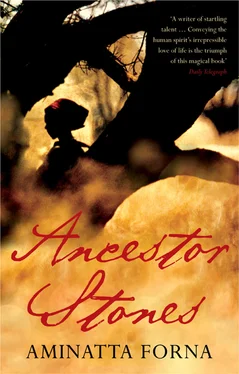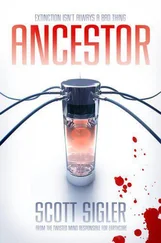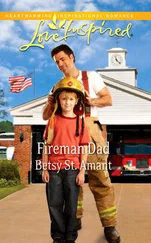One by one we collected each woman from her home, until we walked two, three abreast down the main road. At every polling station along our route we dropped off a pair of women until, once again, it was just the two of us, Redempta and I.
A great cotton tree with buttressed roots stood in the middle of the football ground in front of the schoolhouse. Beyond it, on the steps of one of the classrooms, sat a pair of soldiers. They stood when they saw us, began to move towards us. We, too, advanced at an almost identical pace, neither hurried, nor slow. Straight ahead, until we stopped and faced each other: the soldiers and their adversaries, two middle-aged women.
What did we want? We indicated our badges. Reporting for duty, it crossed my mind to say.
‘It may be dangerous to be out today, there might be trouble,’ said the second soldier, as if we would be so easily cowed.
‘Then so be it,’ I said. ‘We are here to bring in the vote. Now we need to get on, this station was supposed to open an hour ago.’ For some seconds nobody spoke or moved.
The soldiers were roughly the age of my two sons. I watched as the one in front of me bit his lower lip, twisted it and then suddenly dropped his gaze and stepped aside. We moved past him and into the building.
‘We will stay here for your protection,’ he called after us, in a voice that was hollow at the centre.
‘As you please,’ I replied.
My knees shook as I walked, my hands holding on to the handle of my bag were slippery. Once inside we freed the three ballot boxes from the padlock and chains that held them together and set them out in a short, neat row. Just seeing them there, squat and imposing, somehow made me feel better. In a cardboard box along with paper and pens, we found the sign that said ‘Polling Station’ with a big, black arrow and this we placed outside the door. From her bag Redempta unpacked her own special cheese and jam sandwiches, a flask, a can of Peak milk and two cups. I watched her smooth, placid face beneath that terrible cherry wig she wore, absorbed in the task she had set herself.
We settled down to wait.
A man pushing an icebox of soft drinks in an old pram turned the corner, saw the soldiers, thought better of it and moved on with his load. The minutes passed. Dawn had been and gone, not a bird in sight. Outside the soldiers ground one cigarette stub after another under the heels of their boots. That and the scratching of the bats in the branches of the cotton tree, the gentle unfolding and wrapping of wings around bodies, were the only sounds. I could sense my fear skirting the building, attracted by the silence, looking for a way inside.
What did I think of while we waited?
I can only tell you what I didn’t think about. I did not think about whether people would come. Nor did I waste the effort on wishing the soldiers away, because I knew they were there to frighten people off. I didn’t think about the trucks carrying more soldiers all over the city. I didn’t think about the other polling stations, sitting in pools of silence all over the country. Nor did I think about what we would do at the end of the day. Most of all I didn’t think about the fear clawing at the cracks in the windows, scuttling under the floorboards, crawling across the roof, looking for an opening.
Instead I thought about that day, a long time ago, when I sat in a rice-weighing station wearing my favourite pair of red shoes.
The smell of rice dust on a cool morning, so clean and pure. By contrast this room was sweltering and smelled of ink and sour milk. Then it had been the end of the rains, harvest time. The land had been opulent, bursting with hope and fertility. Now, halfway through harmattan, it was desiccated, a semi-desert. The sky was choked with dust. The city stank. Hope had shrivelled and crumbled away.
When people are afraid they stay indoors. They close shutters, bolt doors, hide behind the flimsy tin and cardboard walls of their huts. That day even the police stayed inside, safe behind the thick walls of their solid British-built stations. Only the madmen wandered the streets, dazed and smiling, unexpected lords of the city.
There is but one reason people would venture outside on such a day.
Women’s voices as muted and soft as the music of water. I had fallen into a kind of wakeful reverie, at first the sound drifted over me as though it had escaped from my dreams. I stood up and walked across the room to the door. The standpipe was on the other side of the football ground. The women approached it up a steep, rocky path hidden between the houses, bordered by tall grass on either side. Some were carrying plastic containers and brightcoloured buckets. They were barely clad, a tank top over loose breasts, a lappa carelessly knotted around hips or hitched up and tucked into underwear. Theirs was hot, damp, effortful work.
One of the soldiers, leaning against a door frame, had been picking his nose and flicking the hardened snot at an empty tin. At my appearance he straightened and followed my gaze in the direction of the women. I emptied the remains of my cup of coffee on the ground, nodded at him and we stood, both of us, watching.
A young girl at the water pipe with a baby on her back looked over briefly. I waved. She hesitated, then raised her hand and waved back.
‘Morning-o,’ I called and she echoed my greeting before bending back to her work. I called again, to a woman in a black dress with a comb stuck into her partially braided hair. Then to a girl in an old print frock. Within moments the women had formed a cluster over the water pipe. From time to time one of them straightened and looked over in our direction. More women arrived, were beckoned over, set down their containers and joined the huddle.
Beneath their slouched bodies I could feel the alertness, the muscle and sinew quickening under the skin, as the soldiers watched the water women beneath hooded lids.
Redempta came and stood next to me. She was a big woman. I’m sorry you never knew her. She was not so tall, but wide and straight. We stood shoulder to shoulder. Redempta began to hum. I remember that, because at first I wondered what she was doing. And then quickly I realised and I joined in. It was a woman’s song, one that we were taught by our elders, we used to sing it on the way to the river with our water jars and again on the way back when they were full and heavy. Perhaps the soldiers knew this, perhaps they didn’t. They must have had mothers and sisters, so I guess they did. We hummed in unison and the sound of our humming carried across the empty ground to the women on the other side and gave birth to the miracle that followed.
Those that still held on to their plastic containers set them down, they began to wander over. In the lead was the woman with the baby on her back, she was dressed in an old slip that fell off her shoulders, a green cloth tied around her head. There was something slightly unusual about her, something that made you want to stare. I think it was her eyes, they were hazel instead of deep brown, she was a fair skinned woman. Too fair for most people’s tastes, still I remember even then thinking that she was beautiful. I saw the caution in the tread of her feet on the ground, but nobody watching would ever have guessed it from the way she carried herself, the way all the women carried themselves, as though they had never known a day’s fear.
I straightened the board with the sign on it. I went back inside to take my place. A few moments later I heard Redempta giving directions:
‘Collect a voting paper. Behind the curtain, doesn’t matter which one. Mark your X. One X only, against the name of the candidate of your choice. Sign your name, or make your thumbprint before you leave. Thank you.’
After the women, word went around. Within a short time a queue had formed that flowed across the playing field and looped around the cotton tree. At first people came silent, shuffling, with lowered eyes. But when they saw us going about our business, when they saw how our will had triumphed over the soldiers who now stood uselessly to one side, they raised their heads, took their voting slips and pushed their thumbs into the ink pad with a flourish.
Читать дальше












